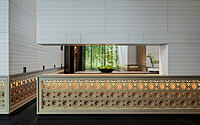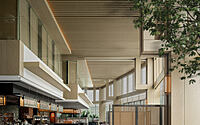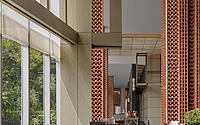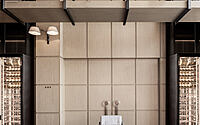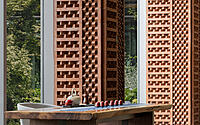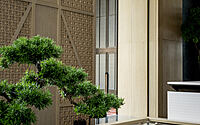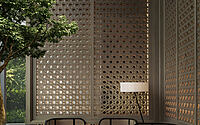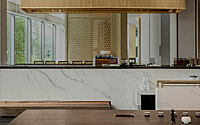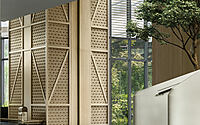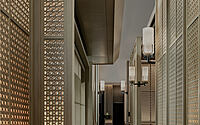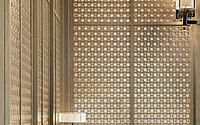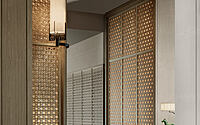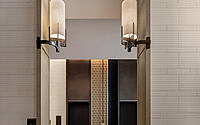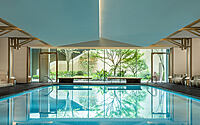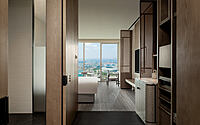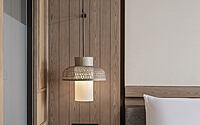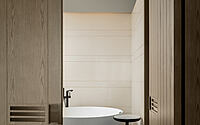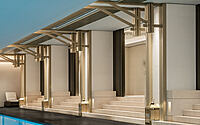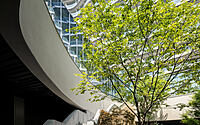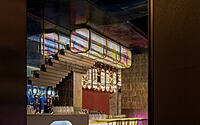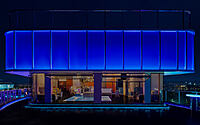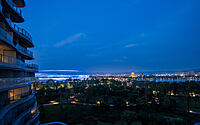Mumian Chengdu Dong’an Lake by CCD/Cheng Chung Design
Mumian Chengdu Dong’an Lake is a luxury hotel located in Chengdu, China, designed in 2021 by Cheng Chung Design.

















Description
Kapok flower, also known as “Mumian flower”, is a beautiful sight to see in Shenzhen across the spring. With flame-like petals blossoming on the tree branches without leaves, the flower presents a strong, heroic gesture, hence is also called “Hero flower”. Originated in Shenzhen, hotel brand Mumian carries a feeling of inner strength, just like the flower.
MUMIAN CHENGDU DONG’AN LAKE is the brand’s first property opened in southwest China. It is built mainly to support the 31st FISU World University Games Summer in Chengdu, but has also become a popular local staycation destination since opening in last year for its strong vacation-like experience. The hotel is located in Longquanyi District, the name of which is inherited from the late Qing Dynasty. Longquanyi was formerly the name of a courier station, and also a geographic name. The courier station was disused in late Qing Dynasty, but the geographic name “Lingquanyi” has been retained.
Courier station and teahouse, glory of the old days
CCD drew on the local terrain, architectural languages and culture of Sichuan and Longquanyi as design elements, and incorporated the lifestyle of ancient Chinese courier stations into the hotel, to take the guests to a time travel to experience the glory of the old days.
After studying and visiting various teahouses, old streets and markets in Chengdu, CCD team decided to adopt a spatial language that brings back the leisurely lifestyle in the past days.
Traditional local rattan weaving craftsmanship is applied at the lobby, which fuses structural aesthetics with a sense of facade.
The rattan elements catch the guests’ eye upon entering the space, seeming to tell the tension of the space and the charm of the city.
Sichuan is rich in bamboo resources. Bamboo elements are commonly seen in local teahouses, which create a natural atmosphere that reflects the harmony between people and nature. Drawing inspiration from bamboo nodes, the artistic lamps bring the hotel guests to immerse in a space integrating teahouse elements, plants and beautiful scenery, to feel the pleasing harmony with nature.
Chengdu people pursue comfort and flavor when drinking tea. Local teahouses provide bamboo chairs, which enables customers to freely choose a comfortable gesture as they want, either sitting or leaning back.
Symbols that represent the attribute and spirit of Chengdu tea culture, such as bamboo chairs, copper teapots and rattan weaving, are extracted and translated into artistic expressions in the space.
The interior adopts rattan screens, partitions, and various forms for daylighting, and meanwhile subtly combines local cultural symbols with spatial lines and functions, to highlight an atmosphere that echoes the teahouse in ancient courier stations.
The space offers a continuous experience shifting between openness and semi-openness, making it more dynamic.
Old-style bamboo chairs, exquisite copper teapots and other details accentuate the cultural symbols of ancient teahouses, which add fun to the space and also evoke resonance to bring the guests closer to the space.
The original artistic lamps inspired by tea-picking baskets bring a fresh feeling, and also adds to the poetry and artistry of the space.
Complemented by various local cultural symbols, functions and scenes in the space are enriched, hence offering unique, playful visual effects and experiences.
The lounge is set beside the window and close to the outdoor yard. It provides the guests with a cozy environment to sit leisurely and embrace the aesthetic view of sky, clouds, rocks and waterscape.
This area presents a restraining aesthetic, and a simple, magnificent artistic style.
Life stage, worldly atmosphere
Tasting a table of Sichuan dishes, drinking a pot of local wine, watching a Sichuan opera, and playing Mahjong… Life in Chengdu is leisurely and slow-paced.
The all-day-dining restaurant is a two-storey space. Arranged with scattered seats, 1F serves a variety of food like roast duck, hot pot and buffet breakfast. 2F accommodates private dining rooms, and is available for diversified activities such as gatherings, banquets and business events.
1F and 2F are respectively conceived as a “street” and a “tower”, reproducing the prosperous commercial scene of Longquanyi in ancient times.
The interior layout and forms inherit elements of local ancient teahouses equipped with opera stages. Structures in the restaurant space are mainly made from timber.
In addition, red bricks, as a typical symbol of local old architecture, are utilized to construct interior walls with different unique patterns, not only endowing the space with a balanced tension but also injecting a playful aesthetic and the city’s inherited architectural concepts into the interior.
Different areas are separated yet connect with each other, with blurry boundary in between. The old and the new collide yet fuse with each other in a subtle manner.
“Food in China, taste in Sichuan”. As a city of gastronomy, Chengdu is filled with a vigorous living atmosphere in its every slab stone-paved street and lane.
CCD divided the restaurant space into hotpot area, roast duck area, buffet area and more to satisfy diverse functions.
Local materials such as wood, ceramics, weaved rattan and bamboo chairs are utilized. The fusion between the traditional and the modern reveals the elegant, leisurely Chengdu style.
The red bricks carry historical heritage, and shows a unique aesthetic that blends modern fashion and classical elegance.
Bubbling spring, serene life
The spiral staircase area features large blank surfaces and simple design, showing respect to life.
CCD created a natural spatial realm that connects interior with outside and records past and future.
The natural wood color and the gray travertine generate a sense of order in the space.
The fitness area takes design inspiration from the mouth of spring in Longquanyi, to express rhythmic beauty.
The ceiling of the swimming pool adopts the architectural language of pitched roof, to extend the sight line to outdoors.
By drawing inspiration from the lights in ancient night markets and utilizing hand-woven lamps, CCD created a simple, elegant and tranquil lighting environment, which conveys the warmth and peace of life.
The warm wood texture and the natural, artistic lighting ambience add softness and warmth to the space.
Zen inn, dreamy life
Inheriting the style of the ancient Longquanyi Courier Station, the guestrooms adopt a warm tone, and apply modern approaches to bring in screens made based on traditional rattan weaving craftsmanship.
Taking the woven bamboo baskets in the ancient courier station as the design prototype, the pendent lamp beside the bedhead is creative and decorative.
The form of the mini bar area echoes tea cabinets in the ancient courier station, integrating traditional charm and modern functions.
Light, breeze, tea and books compose a scene that calms the mind and slows down life.
Simple lines and pure textures generate a leisurely and peaceful ambience.
The interior environment is unified, providing a leisurely and natural living atmosphere and endowing the space with infinite charm.
The guestrooms offer a warm and peaceful home experience.
The design matches the new and the old, and creates a contrast between tradition and fashion.
The terrace provides an open view to the arenas of the FISU World University Games.
Drawing on the unique lifestyle of Chengdu, the project unfolds the imagination of the warm, tasteful local life.
Photography by Qiu Xin
Visit CCD/Cheng Chung Design
- by Matt Watts